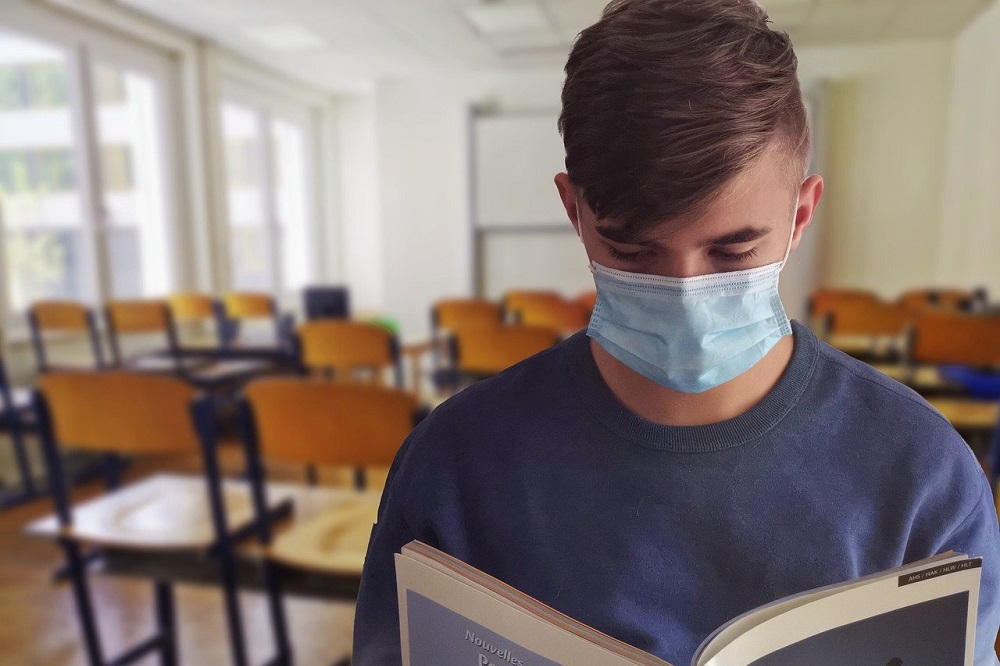News in brief: Covid cases in Welsh schools hit levels last seen in December

Cases of coronavirus in Welsh schools have reached their highest level since the height of the second Wave of the pandemic last December.
According to the latest figures from Public Health Wales, cases involving staff and pupils have more than tripled in three weeks as the spread of the Delta Covid variant accelerates.
PHW has confirmed 238 cases of the virus in Welsh schools this week, up from 87 last week, with 20 of 22 local authorities across the country reporting an increase.
The stats don’t differentiate between pupils and staff but 131 of the new infections were in primary schools, 81 were in secondaries and 23 were linked with independent schools and pupil referral units.
Conwy recorded 36 new cases, the most in Wales and an increase of 25 from the previous week. Denbighshire saw cases jump from 12 cases to 31 and Swansea reported an increase from eight to 28.
First Minister Mark Drakeford said yesterday he sees no reason to instruct schools to move to distanced learning despite the spread of the Delta variant.
Covid cases have more than doubled in the last week within Wales, taking case rates up to the levels last seen in March but at Friday’s Government press briefing, Mr Drakeford said: “We don’t have, at the moment, any active plans to restrict learning.
“There are only a small number of weeks left in this school term and schools are very carefully run and organised to keep the virus at bay.
“Unlike in England we haven’t removed mask wearing in schools despite the discomfort I know that causes to people who wear them all day long.
“We have thousands of lateral flow tests being used every week now to try to minimise disruption.
“Unfortunately, where it is necessary, we are having to send people home for self-isolation and that has risen in schools in Wales over the last couple of weeks.”
‘Disadvantageous’
Mr Drakeford said keeping children in education had been his Government’s “top priority” and added: “(It’s) because we know of the strongly disadvantageous impact which further disruption to children’s education will pose to them.”
The Delta variant is currently responsible for over 80% of all new Covid cases in Wales and figures released by Public Health Wales on Thursday revealed a further 209 cases of the variant have been detected since Monday, taking the total number of people that have tested positive for the mutation to 788.
So far 15 people had been admitted to hospital after contracting the Delta variant in Wales.

First Minister says he’s optimistic mask rules can be eased
Mark Drakeford has revealed anti-Covid measures like wearing facemasks could be eased once all adults in Wales are fully vaccinated.
Facemasks in shops and other indoor public spaces were only made compulsory in Wales last September following an increase in the number of cases of the virus linked to people meeting and socialising with others indoors without physical distancing.
The First Minister said any changes to social distancing restrictions would come once it was clearer the link between rising cases and the number of hospitalisations had been broken but despite the recent increase in Covid cases in Wales linked to the Delta variant he said he was optimistic.
“When everybody has had two doses we will have a much clearer understanding of the relationship between vaccination and falling ill and hospitalisation.
“So let us just for a moment take an optimistic view, because in so far as we understand the data at the moment it’s looking a bit more optimistic.
“At the point the things that we would have restored at level one (of restrictions) would have been restored, people would be able to meet indoors in larger numbers, we would have been able to re-open some further parts of the Welsh economy, people would be able to mix in greater numbers.
“And it may – and this is more provisional, I think – we may be moving away from the mandation of those very important actions we all take in our own lives and continue to advise people to abide by them.”
Figures released by Public Health Wales yesterday confirmed Wales has become the first UK nation to fully vaccinate more than half of its entire population.
A total 1,591,322 of people (50.5%) have now received both Covid-19 jabs, since the start of the mass vaccination programme in December last year.

Parking charges hiked in tourist hot spots
Alex Seabrook, local democracy reporter
Drivers will soon find it harder to park their cars at several tourist spots in the Vale of Glamorgan.
New charges will be introduced at four car parks, while resident-only zones will also be brought in at several places across the Vale.
The car parking charges won’t be brought in until Wales is at Covid-19 alert. level one. Residents in the affected zones will get free permits and won’t have to pay to park.
Barry Island, Cowbridge, Cosmeston and Ogmore-by-Sea are all included in the new parking rules being implemented by Vale of Glamorgan council.
Councillor Peter King, cabinet member for neighbourhood services and transport, said: “Our primary aim is the better management of parking at our resorts and country parks and in our town centres. There is a cost to doing that and to maintaining and sustaining them.”
Car parking charges will be brought in at Porthkerry and Cosmeston country parks, and in Wyndham Street in Barry and the Town Hall in Cowbridge. Country parks will cost £1 for up to two hours, £2 for four hours, and £4 all day. Drivers can buy six and 12-month permits.
Parking at Wyndham Street in Barry and the Cowbridge Town Hall will be free for two hours, then costing £4 for four hours and £6 for all day. Blue badge holders are exempt.
Cllr King said: “The introduction of car park charges at these locations has been the subject of lengthy engagement, consultation and debate. The proposals were approved following a process of scrutiny by councillors, who agreed to them at two all-party scrutiny meetings.
“Our highly regarded country parks are used by many people from outside the Vale of Glamorgan, as well as residents, and it is only reasonable that visitors should help pay for their upkeep and all money generated will be used for this purpose.
“There continues to be free parking available in both Barry and Cowbridge town centres on-street and off-street, and the introduction of charges in Wyndham Street, Barry and Town Hall car park, Cowbridge is designed to increase turnover of spaces, which should help local businesses.”
Resident-only zones will be brought into Cosmeston, Barry Island, the Knap in Barry, Middlegate Court in Cowbridge, and several streets in Ogmore-by-Sea. This follows a lengthy public consultation. Another zone near Llandough Hospital is also being considered.
Cllr King said: “A number of residential streets in the Vale have suffered parking problems for many years due to large numbers of people visiting nearby attractions. This has made it difficult for individuals to access their properties while also negatively impacting traffic flows and highway safety.
“As we will shortly introduce new off-street parking charges that could increase displacement parking, it is important that parking is protected for residents. We asked residents whether they wanted us to implement a system to tackle this problem and the clear answer was ‘yes’.
“That is why we will introduce resident parking controls to the areas mentioned and will shortly consider whether similar measures are suitable for Llandough. I very much hope that these controls will improve the parking situation for those living in these areas whilst also improving traffic flows and highway safety.
“This is a new policy and one that we will monitor closely to determine whether changes are necessary to make it better. It will also inform us should we receive calls for similar treatment to other areas.”

New weight management programme launched
The Welsh Government has published new guidance to help people in Wales manage their weight better.
The new All Wales Weight Management Pathway aims to support the development and delivery of weight management services across the country and for the first time addresses weight issues with children, young people, and families.
A total of £2.9 million in funding has been made available for health boards to develop their local pathways and to support implementation of the guidance, which replaces the previous pathway published in 2010.
The pathway, developed in partnership with professionals including dietitians, nutritionists, psychologists and doctors provides guidance to those looking to commission weight management services as well as to those providing a service, recommending the minimum service requirements and expectations to guide and treat people with differing levels of need.
“The last year has put a huge focus on our health and wellbeing, the new pathway will provide compassionate support in helping people on their weight management journey and will run alongside our Healthy Weight: Healthy Wales strategy to encourage people to make healthier choices and lead more active lives’” Deputy Minister for Mental Health and Wellbeing, Lynne Neagle, said.
In Wales, 27% of four-five year olds in reception class and sixty percent of adults are overweight and a recent study carried out by Public Health Wales revealed 43% of people believe that their weight has increased in the last year.
Support our Nation today
For the price of a cup of coffee a month you can help us create an independent, not-for-profit, national news service for the people of Wales, by the people of Wales.





